multivitamin support
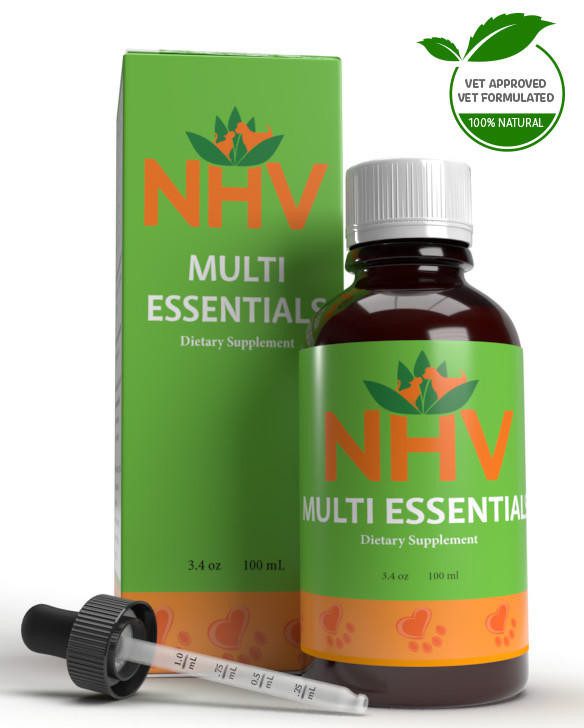
free shipping over $100 (USA & Canada)
1-877-937-4372 the pet expert hotline
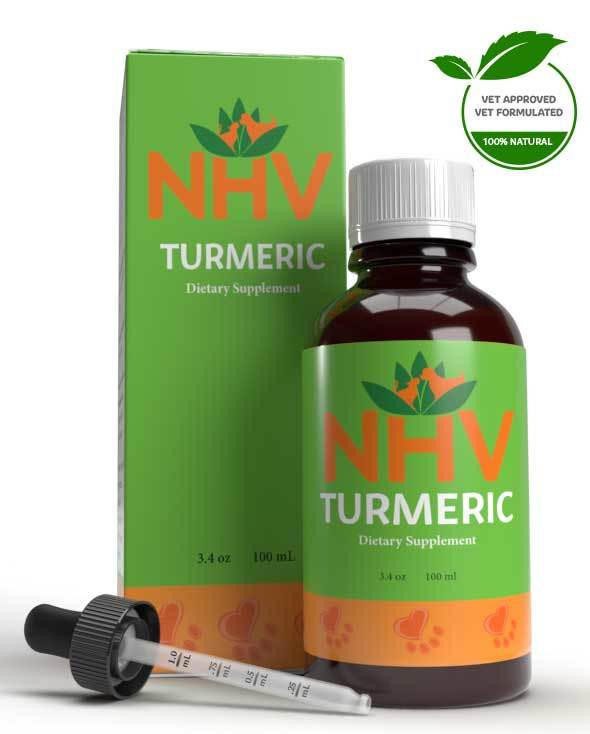
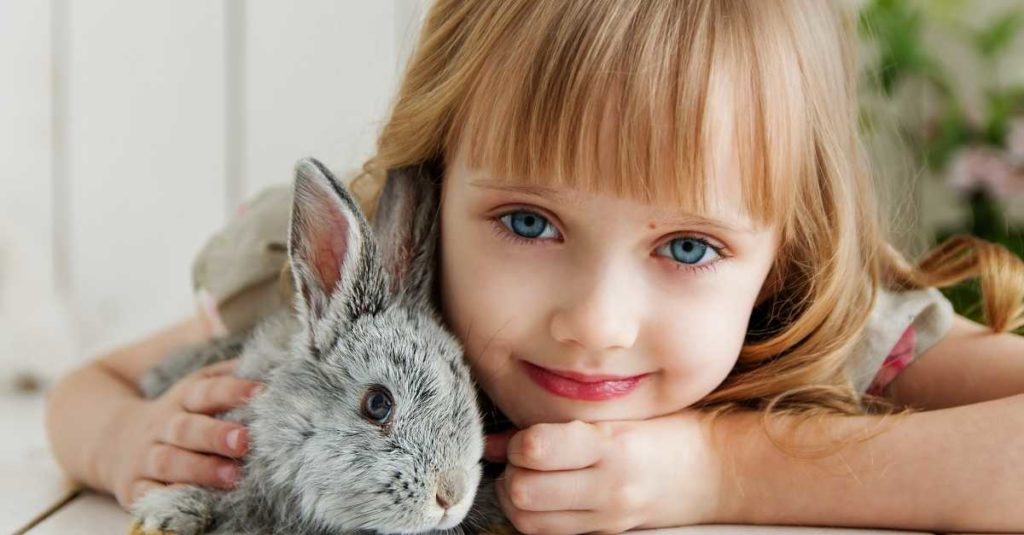
Rabbits are becoming a very popular pet and rabbit owners are demanding quality veterinary care more than ever. Rabbits are very social and curious animals, who thrive on attention and social interaction and can be great companions. Taking proper care of them, however, can demand some extra effort and patience. Rabbits, like all animals, have specific needs when it comes to their food, handling, housing, environment, and playtime. Since this can be a complex subject, I have separated some important tips on taking care of your rabbits into the following categories: food, housing, social life, handling, and extra tips.
Grass hay and fresh grass should comprise about 80% of their overall diet. Darker-green leaves should comprise about 10-20% of their overall diet.
Rabbits are herbivores and grazers and their main diet source should be a constant supply of grass or grass hay to chew. Chewing hay continuously throughout the day helps keep their teeth worn to a proper length, can prevent dental disease, and promotes digestive tract health. The consumption of hay also encourages foraging and grazing. Grass hay and fresh grass should comprise about 80% of their overall diet. You can also offer dark-green leafy vegetables to your rabbit. Leaves like kale, mustard greens, parsley, cilantro, and basil are excellent for them. Darker lettuce varieties like romaine lettuce are okay to be given as well. Darker-green leaves should comprise about 10-20% of their overall diet.
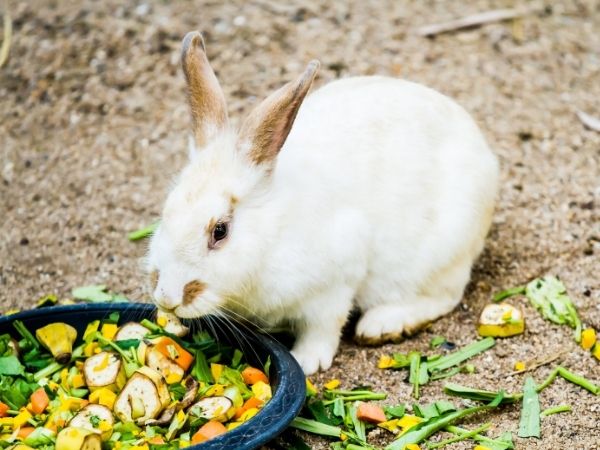
Pellets should be plain only and given a maximum of 1 tablespoon/kg with a minimum crude fibre of 18% in its composition. Pellets should not count for more than 5% of their overall diet and they should be formulated for domestic rabbits and not for commercial rabbits with farming purposes.
What many pet owners do not know is that carrots can be given as TREATS ONLY. Carrots – and fruit in general like apples- are high in sugar and should only be fed in small amounts and as occasional treats. Treats made of herbs such as cilantro, parsley, arugula, and basil are better options.
Remember that you should always offer clean and fresh water as well and change it at least once a day. For more information about what to feed your rabbit, click here.
Indoor housing is essential for a bunny’s healthy life. Domestic rabbits are very sensitive to stressful situations like the approach of a threat or a predator. In fact, stress, especially the stress related to predation, crowding, heat, and inappropriate caging, may affect the behavior of a rabbit.
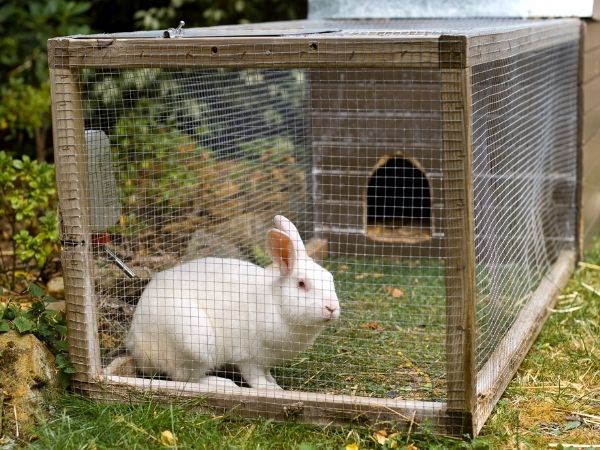
Apart from that, an indoor bunny will be safe from fleas, ticks, Rabbit Viral Haemorrhagic Disease (VHD), and many other viruses and parasites, in general, that can lead to fatal diseases. To read more about diseases in rabbits, click here.
Regular dog/cat cages can be used as a temporary enclosure for your rabbit if the spacing between the cage wires is small enough to prevent your rabbit’s head or limbs from getting stuck. Avoid wire flooring because they can cause locomotor problems over time. In case you have one, make sure to cover it properly, but be careful.
A hutch is recommended for temporary use only and so they can have a safe place to sleep. The hutch should be predator-proof, located somewhere that is rain and heat-proof, and should have netting to keep out flies and mosquitos. Ideally, your bunny should have plenty of space to exercise, run, jump, and express their normal behaviors, like digging freely and safely out of the hutch. They need this so they can keep mentally and physically stimulated. They should also be able to sit and stand upright and spend some time enjoying sunlight safely. You can find more resourceful information in sources like the Rabbit Welfare Association and Fund website.
Rabbits are naturally a social species and should not be kept alone, or without at least one other rabbit with whom they can have a healthy coexistence. It’s extremely important to have rabbits spayed/neutered before adoption, if possible. This preventive measure avoids accidental litters, uterine cancer, spraying, and other hormone-driven behaviors in both females and males.
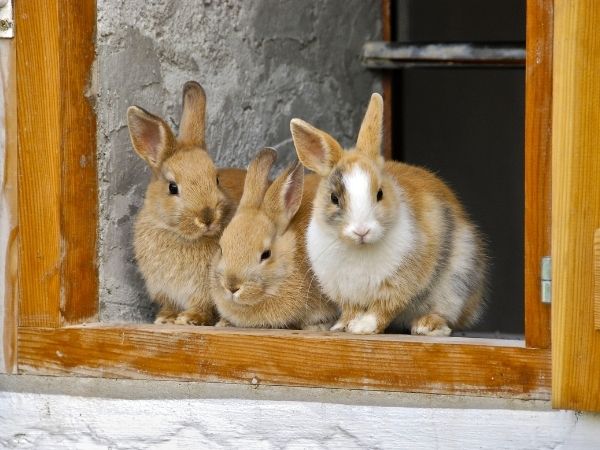
Many rabbits show fear behaviors when lifted off the ground. Research has shown that around 60% of pet rabbits struggle when lifted and fear-related aggression is very common in those cases. The more predictable their environment and the more securely they are handled, the more relaxed and sociable they become. Many rabbits that are given away to shelters have been traumatized in their previous environments. In many of those cases, they may have learned to survive by nipping or boxing, however, the good news is that these behaviors can usually be eliminated by correct handling and social interaction. Talk to a professional behaviorist in case you need help with socializing your pet rabbit.
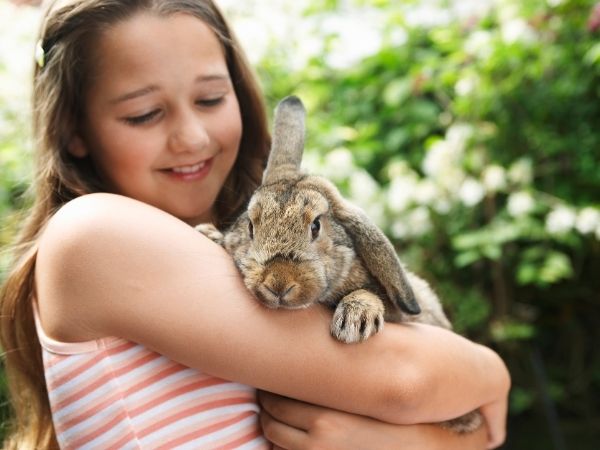
NHV supplements can help your furry bunny live a healthy happy life.
Besides a balanced diet and a safe and healthy environment, we would recommend:
NHV Multi Essentials – Multi Essentials helps to fill dietary gaps, supporting your rabbit’s digestion, and provides support with promoting strong muscle and bone growth. It’s high in vitamins, minerals, and antioxidants to ensure your bunny of any age is getting energy, vitality, and health for a happy life.
NHV Stimmune – Rabbits can easily succumb to viral and bacterial infections like the Rabbit Viral Hemorrhagic Disease and Snuffles, respectively. Stimmune is an herbal formula that helps support the immune system. It is beneficial for autoimmune conditions, dermatitis (skin allergies), recurrent infections, food allergies, and helps strengthen the body against infection.
NHV Turmeric – The active compound in turmeric is curcumin. Studies have shown Turmeric to have excellent anti-inflammatory, antioxidant, antifungal, antibacterial, anticoagulant, antiseptic, astringent properties. They have also shown that Turmeric helps with liver function, bile production, and wound healing. The healing properties of curcumin may also be beneficial for rabbits with autoimmune diseases, liver disorders, heart conditions, arthritis, and rabbits who need extra circulatory support. NHV Turmeric is also beneficial for arthritic conditions in rabbits due to the anti-inflammatory properties and its COX2 inhibitor. The use of turmeric extracts in a rabbit’s daily diet may help scavenge free radicals, increase antioxidant enzymes, and inhibit lipid peroxidation.
NHV Matricalm – This supplement helps reduce stress and anxiety in rabbits. Stress can worsen some preexisting health conditions and Matricalm may help rabbits feel better while also providing a calming effect. While many rabbits respond best to vet-prescribed medications, others respond very well to the components of Matricalm alone or associated with the vet prescribed treatments.
In case you have any questions on how our supplements can help your little furry bunny, please do reach out to us via phone, live chat, email, or social media. Our Pet Experts will be more than happy to assist you naturally!
To view all our supplements for rabbits, click here.
multivitamin support

All-Natural Multivitamin for Pocket Pets
buy 2 and save $3
3 month supply for a small to medium size pet
What is it?
To help your gerbil, teddy bear hamster, or hairless guinea pig age gracefully, our pocket pet supplements are formulated to deliver vital nutrients, help maintain many body processes and encourage healthy skin and coat.
How does it work?
Why should I trust it?
NHV supplements use human-grade herbs, so your pet only gets the best!

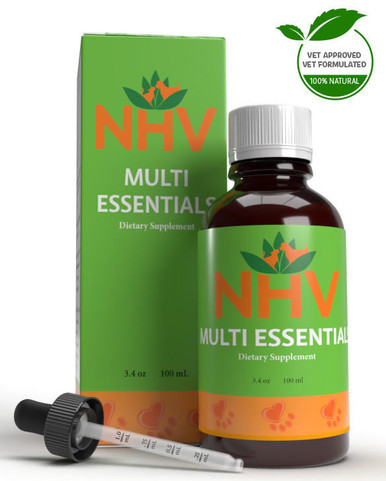
What is it?
To help your gerbil, teddy bear hamster, or hairless guinea pig age gracefully, our pocket pet supplements are formulated to deliver vital nutrients, help maintain many body processes and encourage healthy skin and coat.
How does it work?
Why should I trust it?
NHV supplements use human-grade herbs, so your pet only gets the best!

As pet parents, we all want our pets to live long and happy lives - whether they're large or tiny pocket-sized pets! Pocket pets are small animals that include:
A vitamin deficiency can have detrimental effects on a pocket pet’s health and may lead to many different health conditions. A long and healthy life starts with good nutrition, so for pet parents looking for natural supports for their teddy bear hamster, gerbil, or chinchilla, our Multi Essentials for Pocket Pets offers a liquid formulation made with a blend of 11 nutrient-dense herbs formulated to help maintain many body processes, help metabolize vitamins and minerals, and aid digestion. It is beneficial support for pocket pets exposed to environmental toxins as well as encourages healthy skin and coat. All of our supplements are made with full-spectrum plant extracts that are crafted specifically for pets of all sizes. Full-spectrum means that all of the vitamins, minerals, and trace elements are kept intact during the extraction process to make it easily absorbable for your pocket pet.
Having an imbalanced diet can cause a lot of stress and discomfort for your furry friend. Our Multi Essentials for Pocket Pets is an all-natural herbal remedy formulated to help fill nutritional voids, help reduce fatigue and help to improve digestion.
Common health issues caused by a nutrient deficiency:
With NHV Supplements, you can give your furkiddo the extra support they need to age gracefully! All of our care products are created with 100% organic or wildcrafted ingredients and can be used safely alongside vet-prescribed medication. If you have any questions about pet supplements or holistic remedies, Get in touch with an NHV Pet Expert - we’re here for you every step of the way!
Made with the finest, organically grown, or ethically harvested herbs. Made specifically for pets, vet-formulated and vet approved.
Select your pet's weight to determine the correct dose.
For ferrets: 0.5ml twice a day
For rabbits and guinea pigs: 0.5 ml twice a day
For hamsters and mice: 1 drop per two pounds twice a day
How to Administer
Shake well before use. The easiest method is to use the dropper provide and place the drops into your bird's favorite treat. You can also use the dropper and squirt directly into the bird’s mouth.
For Best Results
Herbal dietary supplements are beneficial to the health and wellbeing of your pet and are safe for long-term use. Every pet responds to natural herbal supplements differently, therefore it is important to be consistent and administer the product daily. Supplements generally take two to four weeks to take effect, however this will vary from one animal to the next.
Product Storage
All NHV Natural Pet Products are pure herbal extracts and contain no artificial additives, preservatives or coloring. Shelf life after opening is 6 months and must be refrigerated after opening.
Cautions and Contraindications
Do not use Multi Essentials in pregnant or nursing animals. Speak to your vet before using our products. A second visit is recommended if your pet’s condition does not improve, or deteriorates after continued use of the supplements.
All information provided by NHV Natural Pet Products is for educational purposes only.
As pet parents, we all want our pets to live long and happy lives - whether they're large or tiny pocket-sized pets! Pocket pets are small animals that include:
A vitamin deficiency can have detrimental effects on a pocket pet’s health and may lead to many different health conditions. A long and healthy life starts with good nutrition, so for pet parents looking for natural supports for their teddy bear hamster, gerbil, or chinchilla, our Multi Essentials for Pocket Pets offers a liquid formulation made with a blend of 11 nutrient-dense herbs formulated to help maintain many body processes, help metabolize vitamins and minerals, and aid digestion. It is beneficial support for pocket pets exposed to environmental toxins as well as encourages healthy skin and coat. All of our supplements are made with full-spectrum plant extracts that are crafted specifically for pets of all sizes. Full-spectrum means that all of the vitamins, minerals, and trace elements are kept intact during the extraction process to make it easily absorbable for your pocket pet.
Having an imbalanced diet can cause a lot of stress and discomfort for your furry friend. Our Multi Essentials for Pocket Pets is an all-natural herbal remedy formulated to help fill nutritional voids, help reduce fatigue and help to improve digestion.
Common health issues caused by a nutrient deficiency:
With NHV Supplements, you can give your furkiddo the extra support they need to age gracefully! All of our care products are created with 100% organic or wildcrafted ingredients and can be used safely alongside vet-prescribed medication. If you have any questions about pet supplements or holistic remedies, Get in touch with an NHV Pet Expert - we’re here for you every step of the way!
Made with the finest, organically grown, or ethically harvested herbs. Made specifically for pets, vet-formulated and vet approved.
Select your pet's weight to determine the correct dose.
For ferrets: 0.5ml twice a day
For rabbits and guinea pigs: 0.5 ml twice a day
For hamsters and mice: 1 drop per two pounds twice a day
How to Administer
Shake well before use. The easiest method is to use the dropper provide and place the drops into your bird's favorite treat. You can also use the dropper and squirt directly into the bird’s mouth.
For Best Results
Herbal dietary supplements are beneficial to the health and wellbeing of your pet and are safe for long-term use. Every pet responds to natural herbal supplements differently, therefore it is important to be consistent and administer the product daily. Supplements generally take two to four weeks to take effect, however this will vary from one animal to the next.
Product Storage
All NHV Natural Pet Products are pure herbal extracts and contain no artificial additives, preservatives or coloring. Shelf life after opening is 6 months and must be refrigerated after opening.
Cautions and Contraindications
Do not use Multi Essentials in pregnant or nursing animals. Speak to your vet before using our products. A second visit is recommended if your pet’s condition does not improve, or deteriorates after continued use of the supplements.
All information provided by NHV Natural Pet Products is for educational purposes only.
immune & virus support

BK-Detox & Stimmune
bundle and save with pet expert kits
3 month supply for a small to medium size
What is it?
NHV’s Recurrent Infections Kit is for pets who need a little extra support to help restore their body’s natural defenses.
How does it work?
Why trust it?
NHV supplements are vet-formulated and vet-approved.


What is it?
NHV’s Recurrent Infections Kit is for pets who need a little extra support to help restore their body’s natural defenses.
How does it work?
Why trust it?
NHV supplements are vet-formulated and vet-approved.

As pet parents, we all want our little ones to live happy, healthy lives. Sadly for some of our four-legged friends, they are prone to infections that keep coming back (despite taking many rounds of medication). These may include ear infections, fungal (yeast infections), and moist dermatitis (itchy skin). In some cases, our furkiddos' bodies become resistant to their vet-prescribed antibacterial or antiviral meds. And their immune health may become weakened over time (if they are constantly trying to fight off an infection that won't go away). This weakened state may lead to a buildup of toxins in the blood and liver. BK-Detox and Stimmune work together to offer support to improve your pet's natural defenses, as well as help to restore their immune system and expel harmful toxins.
Nasty infections that keep coming back are a real drag! And cause a lot of discomfort for our furry friends. Most pets will experience an infection of some kind during their lifetime, and hopefully, their immune system doesn't take too much of a hit. If an infection keeps coming back, even with the help of vet-prescribed medication, then your pet's immune system could use a little extra support. BK-Detox contains ingredients like cleavers, burdock, and gotu kola that are very beneficial for helping to rid the body of harmful toxins (that may buildup from illness) and providing antimicrobial support. Stimmune helps to restore the immune system and immune function by boosting antibody production, white blood cell count, and spleen cell count.
Your pet’s health means everything to us. That’s why we made our Recurrent Infections Gold Support 100% natural, easy to administer (liquid formula) and made with only the finest organic ingredients. Get in touch with an NHV Pet Expert if you want to talk to someone about your little one’s unique health needs - we are always happy to help!
NHV supplements are formulated by a holistic veterinarian and master herbalist to be gentle, effective remedies that complement a vet-formulated care plan, but they should never replace professional advice from your veterinarian. If you have any questions about your furkiddo’s health, get in touch with an NHV Pet Expert.
Made with the finest, organically grown, or ethically harvested herbs. Made specifically for pets, vet-formulated, and vet approved.
BK-Detox
Stimmune
Select your pet's weight to determine the correct dose.
To be taken twice daily. Determine your pet’s weight and then use the easy chart below to determine the correct dose. This is the minimum dosage.
Pet's Weight Dosage
0 - 15 lb = 0.5 ml
16 - 30 lb = 1.0 ml
31 - 45 lb = 1.5 ml
46 - 60 lb = 2.0 ml
61 - 75 lb = 2.5 ml
Over 75 lb = 3.0 ml
For small animals (rabbits, ferrets), avians and reptiles use 1 drop for every 2 lb of body weight.
How to Administer
Shake well before use. The easiest method is to use the dropper provided and place the drops into your pet’s food or favorite treat. You can also use the dropper and squirt directly into the pet’s mouth. Some pets can be finicky, if this occurs consider hiding the drops in foods most pet’s love such as fish, chicken or yogurt or a favorite treat. If your pet only eats dry food then soak a few kibbles at feeding time.
For Best Results
Herbal dietary supplements are beneficial to the health and well-being of your pet and are safe for long-term use. Every pet responds to natural herbal supplements differently, therefore it is important to be consistent and administer the product daily. Supplements generally take two to four weeks to take effect, however this will vary from one animal to the next.
Product Storage
All NHV Natural Pet Products are pure herbal extracts and contain no artificial additives, preservatives or coloring. Shelf life after opening is 6 months and must be refrigerated after opening.
Cautions and Contraindications
Do not use in pregnant or nursing animals.
All information provided by NHV Natural Pet Products is for educational purposes only.
As pet parents, we all want our little ones to live happy, healthy lives. Sadly for some of our four-legged friends, they are prone to infections that keep coming back (despite taking many rounds of medication). These may include ear infections, fungal (yeast infections), and moist dermatitis (itchy skin). In some cases, our furkiddos' bodies become resistant to their vet-prescribed antibacterial or antiviral meds. And their immune health may become weakened over time (if they are constantly trying to fight off an infection that won't go away). This weakened state may lead to a buildup of toxins in the blood and liver. BK-Detox and Stimmune work together to offer support to improve your pet's natural defenses, as well as help to restore their immune system and expel harmful toxins.
Nasty infections that keep coming back are a real drag! And cause a lot of discomfort for our furry friends. Most pets will experience an infection of some kind during their lifetime, and hopefully, their immune system doesn't take too much of a hit. If an infection keeps coming back, even with the help of vet-prescribed medication, then your pet's immune system could use a little extra support. BK-Detox contains ingredients like cleavers, burdock, and gotu kola that are very beneficial for helping to rid the body of harmful toxins (that may buildup from illness) and providing antimicrobial support. Stimmune helps to restore the immune system and immune function by boosting antibody production, white blood cell count, and spleen cell count.
Your pet’s health means everything to us. That’s why we made our Recurrent Infections Gold Support 100% natural, easy to administer (liquid formula) and made with only the finest organic ingredients. Get in touch with an NHV Pet Expert if you want to talk to someone about your little one’s unique health needs - we are always happy to help!
NHV supplements are formulated by a holistic veterinarian and master herbalist to be gentle, effective remedies that complement a vet-formulated care plan, but they should never replace professional advice from your veterinarian. If you have any questions about your furkiddo’s health, get in touch with an NHV Pet Expert.
Made with the finest, organically grown, or ethically harvested herbs. Made specifically for pets, vet-formulated, and vet approved.
BK-Detox
Stimmune
Select your pet's weight to determine the correct dose.
To be taken twice daily. Determine your pet’s weight and then use the easy chart below to determine the correct dose. This is the minimum dosage.
Pet's Weight Dosage
0 - 15 lb = 0.5 ml
16 - 30 lb = 1.0 ml
31 - 45 lb = 1.5 ml
46 - 60 lb = 2.0 ml
61 - 75 lb = 2.5 ml
Over 75 lb = 3.0 ml
For small animals (rabbits, ferrets), avians and reptiles use 1 drop for every 2 lb of body weight.
How to Administer
Shake well before use. The easiest method is to use the dropper provided and place the drops into your pet’s food or favorite treat. You can also use the dropper and squirt directly into the pet’s mouth. Some pets can be finicky, if this occurs consider hiding the drops in foods most pet’s love such as fish, chicken or yogurt or a favorite treat. If your pet only eats dry food then soak a few kibbles at feeding time.
For Best Results
Herbal dietary supplements are beneficial to the health and well-being of your pet and are safe for long-term use. Every pet responds to natural herbal supplements differently, therefore it is important to be consistent and administer the product daily. Supplements generally take two to four weeks to take effect, however this will vary from one animal to the next.
Product Storage
All NHV Natural Pet Products are pure herbal extracts and contain no artificial additives, preservatives or coloring. Shelf life after opening is 6 months and must be refrigerated after opening.
Cautions and Contraindications
Do not use in pregnant or nursing animals.
All information provided by NHV Natural Pet Products is for educational purposes only.
Published: November 14, 2020